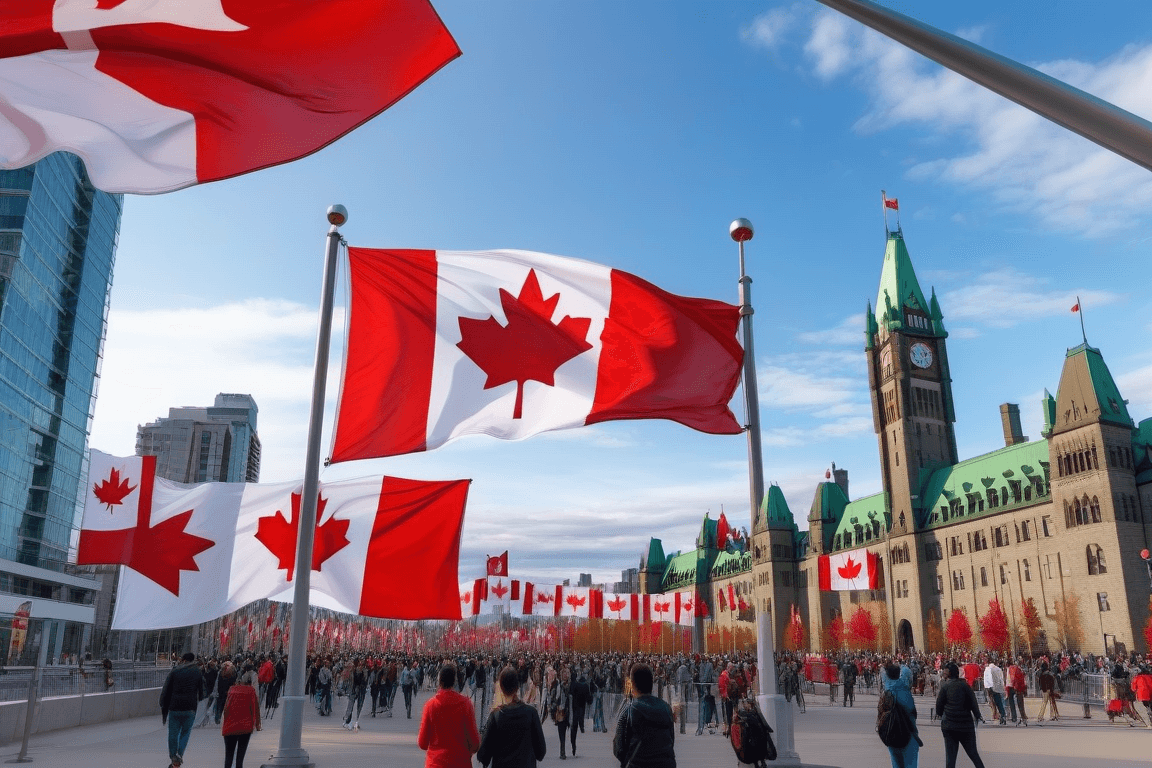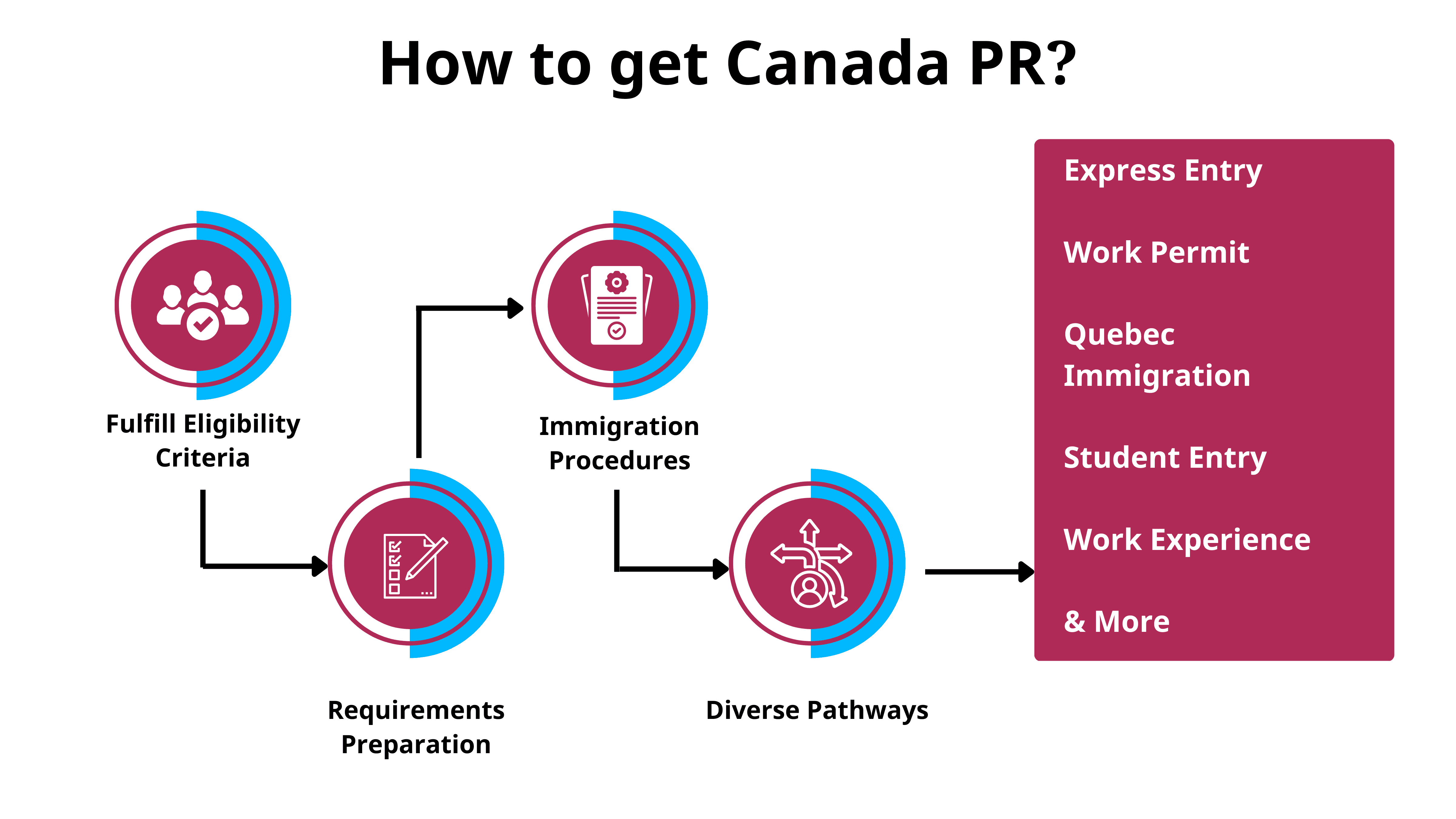Need Help with the Process?

Canada PR Permanent Residency
Why apply for Canada PR?
Canada plans to invite 485,000 PRs in 2024 and aims for 1.5 million new PRs by 2026.
Over a million jobs in Canada are vacant for more than 100 days, offering potential earnings of 5 to 8 times your current salary.
Benefits of Canadian residency include access to Universal Healthcare, free education for children, retirement benefits, and a simplified path to Canadian Citizenship.
Canada's Permanent Resident (PR) status permits living in the country for five years, while eligibility for citizenship requires residing under PR status for four years.
Benefits of Canadian PR
- Residing in Canada through immigration grants you the freedom to live, work, and pursue studies across the country.
- Earning in Canadian dollars becomes feasible, benefiting from one of the world's strongest currencies.
- Obtaining Canadian citizenship within three years post-immigration process completion is possible with guidance from a certified Canadian immigration consultant.
- Access to affordable universal healthcare extends to you and your family, ensuring comprehensive healthcare benefits.
- Your children receive free education up to university level, alongside various scholarship opportunities for higher education.
- Diverse job prospects abound across industries like medical, teaching, IT, hospitality, manufacturing, and more.
- Canada boasts the world's simplest immigration process, further streamlined by expert guidance from immigration consultants.
- You have the possibility to bring your entire family, including parents, when immigrating to Canada.
- Canada PR holders are eligible for unemployment benefits and enjoy legal protection under Canadian laws.
Canada PR Eligibility
- Residing in Canada through immigration grants you the freedom to live, work, and pursue studies across the country.
- Earning in Canadian dollars becomes feasible, benefiting from one of the world's strongest currencies.
- Obtaining Canadian citizenship within three years post-immigration process completion is possible with guidance from a certified Canadian immigration consultant.
- Access to affordable universal healthcare extends to you and your family, ensuring comprehensive healthcare benefits.
- Your children receive free education up to university level, alongside various scholarship opportunities for higher education.
- Diverse job prospects abound across industries like medical, teaching, IT, hospitality, manufacturing, and more.
- Canada boasts the world's simplest immigration process, further streamlined by expert guidance from immigration consultants.
- You have the possibility to bring your entire family, including parents, when immigrating to Canada.
- Canada PR holders are eligible for unemployment benefits and enjoy legal protection under Canadian laws.
Canada PR requirements
To apply for Canada PR, review these requirements:
- Age
- Education
- Work Experience
- Language Proficiency
- Adaptability
- Arranged Employment
Under the PNP program, applicants need ties to the province, like working or studying there. To qualify, aim for 67 out of 100 points based on:
- Age: Optimal points for ages 18-35, fewer points for ages over 35, with a maximum age limit of 45.
- Education: Equivalence to Canadian high school education is necessary.
- Work Experience: A year of full-time experience is minimum, more experience gains more points. Relevant occupations are in Skill Type 0 or Skill Level A or B of the NOC.
- Language: A minimum IELTS band score of 6, taken within the last 2 years. Extra points for French proficiency.
- Adaptability: Partners migrating with you grant 10 additional points.
- Arranged Employment: Up to 10 points if you have a valid job offer from a Canadian employer.
How to get Canada PR?
Indians seeking a Canada PR visa must fulfill eligibility criteria and prepare all necessary requirements. Subsequently, follow the steps outlined below to submit your Canada PR visa application from India.
- Immigration procedures vary based on your educational, professional background, and personal preferences.
- Numerous immigration pathways in Canada can be overwhelming for first-time applicants, hence seeking guidance from an immigration consultant is advantageous.
- Canada employs a diverse immigration system where federal and provincial governments welcome skilled, semi-skilled, and agricultural workers.
- The Express Entry stream, operating on a points-based system, remains the most sought-after pathway for immigration to Canada.
- Work-permit visas enable temporary work in Canada and offer a route to pursue permanent residency without prior residence in the country.
- Quebec, as an autonomous region, offers its unique immigration pathways within Canada.
- Another approach involves entering Canada as a student, gaining work experience in a Canadian company, and earning additional points for migration via the Express Entry.

8 programs to get into Canada
-
Express Entry
- Federal Skilled Workers Program (FSWP)
- Federal Skilled Trades Program (FSTP)
- Canadian Experience Class (CEC)
-
PNP’s
- All cities
-
Atlantic Immigration Pilot
-
Quebec Skilled Worker Program
-
Family Sponsorship
-
Startup Visa program
Cost of Living?
The average cost of living in Canada varies significantly depending on the region and lifestyle. Here's a rough breakdown of monthly expenses:
- Housing: Rent for a one-bedroom apartment can range from CAD 1,200 to CAD 2,500, varying based on location. Larger cities like Toronto and Vancouver tend to have higher rents.
- Utilities: Utility bills (electricity, heating, cooling, water, and garbage) can average around CAD 100 to CAD 150 per month.
- Transportation: Public transit passes can cost around CAD 100 to CAD 150 per month. Owning a car involves expenses such as insurance, fuel, and maintenance, which can vary significantly.
- Food: Monthly grocery expenses for a single person might range from CAD 300 to CAD 500, depending on dietary habits and location.
- Healthcare: Basic healthcare is covered by the government, but additional costs for prescriptions, dental care, and vision might require private insurance, adding around CAD 50 to CAD 100 per month.
- Entertainment and Miscellaneous: Additional expenses for entertainment, dining out, clothing, personal care, and other miscellaneous items might average around CAD 200 to CAD 500 per month.
Overall, the average cost of living for a single person can range from CAD 2,000 to CAD 4,000 per month, while expenses for families or in larger cities can be higher. These figures are estimates and can vary based on individual circumstances and location within Canada.